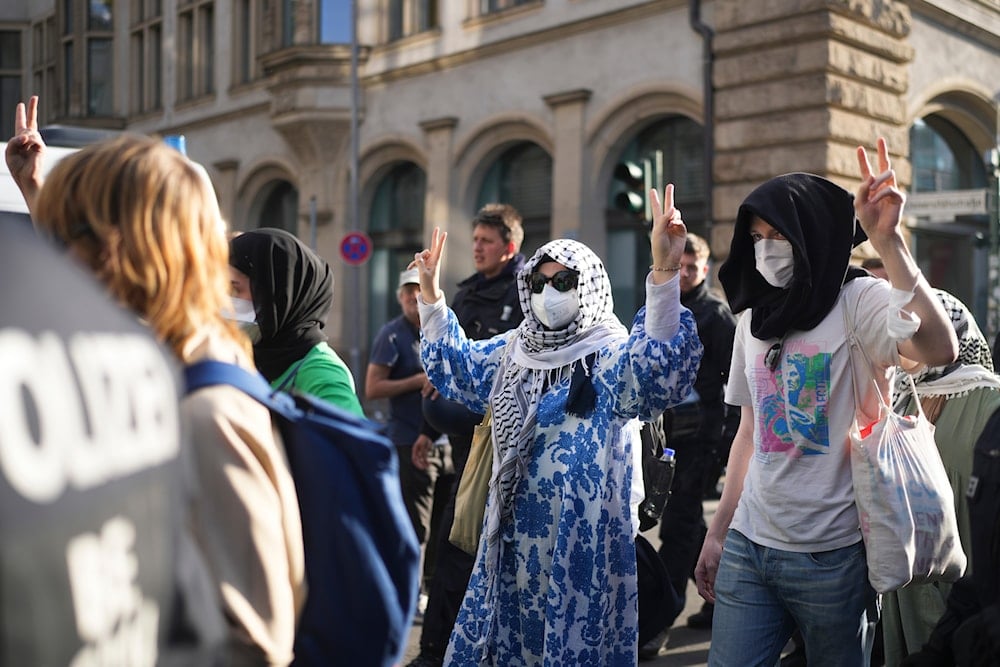Muslims in Europe experience ‘worrying surge’ in racism: Survey
Respondents reported instances of children being bullied at school, disparities in access to job opportunities, and discrimination in the rental and housing markets.
-

Pro-Palestinian demonstrators who show the victory sign are escorted by police as they leave a building of the Humboldt University in Berlin, Germany, on May 23, 2024. (AP)
Muslims throughout Europe are facing a "concerning increase" in racism, partly driven by "dehumanizing anti-Muslim rhetoric," according to the EU's foremost human rights agency.
In a recently published survey, nearly half of the Muslim respondents reported experiencing discrimination.
The survey, released on Thursday by the EU Agency for Fundamental Rights (FRA), included responses from 9,600 Muslims across 13 member states and revealed that racism and discrimination permeate many areas of their daily lives.
Respondents reported instances of children being bullied at school, disparities in access to job opportunities, and discrimination in the rental and housing markets.
Even though the survey was conducted prior to October 7, 2023, and the launch of Operation al-Aqsa Flood and the war on Gaza, the Vienna-based agency revealed that information from civil society organizations and national authorities suggested a continued rise in anti-Muslim crimes since the outbreak of the war.
“We are witnessing a worrying surge in racism and discrimination against Muslims in Europe,” said the agency’s director, Sirpa Rautio, adding, “This is fuelled by conflicts in the Middle East and made worse by the dehumanizing anti-Muslim rhetoric we see across the continent.”
After Operation al-Aqsa Flood, officials scrambled to contain a rise in hate crimes aimed at the Muslim communities, such as dozens of letters containing threats and insults sent to Muslim councils and mosques in France.
Rise of far-right, hate crimes against Muslims
The FRA found that 47% of Muslims surveyed in Austria, Belgium, Denmark, Finland, France, Germany, Greece, Ireland, Italy, Luxembourg, the Netherlands, Spain, and Sweden reported experiencing racism in the five years before 2022, a notable rise from 39% in 2016.
The reported rates of discrimination seem closely tied to the rise of far-right movements. In Austria, where the Nazi-founded anti-immigration Freedom Party (FPÖ) recently became the most-voted party, 71% of Muslims reported experiencing racism.
Similarly, in neighboring Germany, where the anti-immigration Alternative für Deutschland (AfD) has been steadily gaining support, 68% of Muslims reported facing discrimination.
Across the 13 EU member states surveyed, 39% of Muslims reported encountering discrimination in the job market, highlighting significant barriers to equitable employment. Additionally, 41% of respondents found themselves working in positions for which they were overqualified.
One-third of respondents (35%) reported being hindered from buying or renting a home due to discrimination, an increase from 22% in 2016.
“These phenomena are both pervasive and persistent,” stated Vida Beresnevičiūtė, a co-author of the survey.
Additionally, more than half of Muslims born in Europe (55%) reported experiencing racial discrimination while searching for work in the past five years.
Women who wear religious attire, including headscarves, reported experiencing significantly higher rates of discrimination in the labor market. Among women aged 16 to 24 who don religious clothing, the rate of reported discrimination surged to 58%, highlighting the unique challenges they face in securing employment.
Few individuals perceived it as beneficial to report their experiences, with only 6% indicating that they had filed a complaint or report regarding a recent incident.
The FRA urged member states to enforce stricter sanctions against discrimination and hate crimes while also emphasizing the importance of collecting equality data, including information on ethnic or racial origin.

 3 Min Read
3 Min Read








